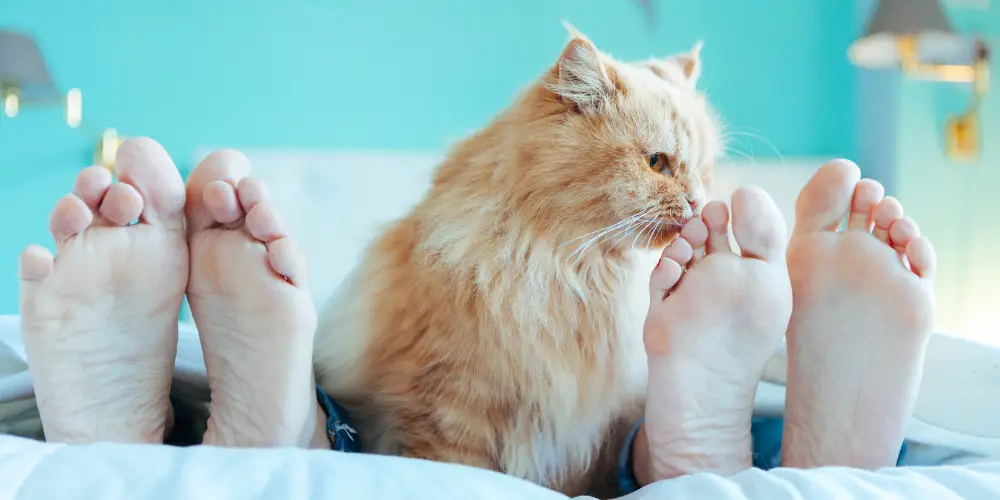Every cat owner has experienced this: you’re cozily tucked in bed, on the brink of falling asleep, when suddenly, your peaceful slumber is interrupted by a swift pounce on your feet. This is a familiar scenario for many, leading to the question: Why do cats attack feet in bed?
Cats attack feet in bed for several reasons: mimicking prey movement, teething in kittens, expressing affection, playfulness, and seeking attention. These behaviors are instinctive, playful, and affectionate, and may also be a way for cats to seek attention or alleviate teething discomfort.
While it may seem quirky or even mischievous, this behavior is deeply rooted in the feline instinct.
Understanding this can provide insights into the mysterious world of our feline companions and help strengthen the bond between cats and their owners.
This article delves into the reasons behind this typical cat behavior, from their natural predatory instincts to how they communicate and express affection.
Key Takeaways
- Cats’ instinctual hunting behavior and playful nature often lead them to attack feet in bed.
- Feet movement under blankets can trigger a cat’s predatory instincts due to its resemblance to prey.
- Kittens might attack feet more frequently during their teething phase.
- Foot-attacking can be a cat’s way of expressing affection, a behavior learned in kittenhood.
- Regular interactive play with toys can redirect a cat’s hunting instincts away from its feet.
- Distinguishing between playful and aggressive behaviors is key to addressing this issue effectively.
- Consistency in training and alternative engagement are essential in modifying a cat’s behavior.
- Establishing a comfortable sleeping spot for the cat can reduce nighttime disturbances.
Understanding Cat Behavior
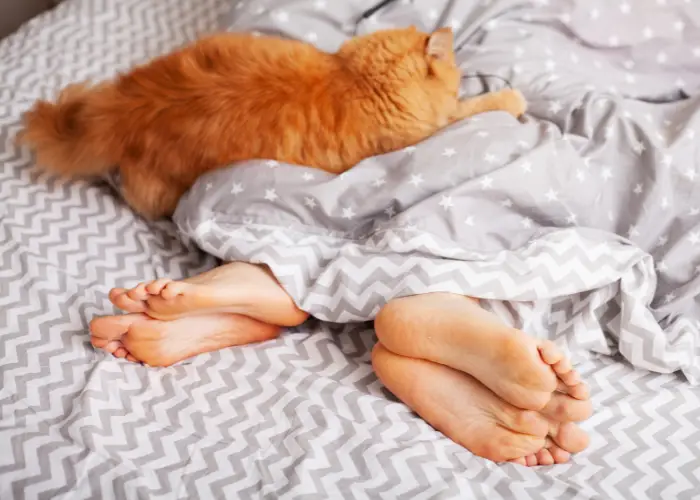
Cats, in their essence, are fascinating creatures, and their behavior often reflects their wild ancestors’ traits.
A key aspect of this is their predatory nature. Unlike humans, cats are not just predators but also solitary hunters.
This means they are hardwired to stalk, pounce, and capture their prey – behaviors that are often playfully exhibited toward the moving feet of their unsuspecting human companions.
But why feet?
When under blankets, feet can resemble the size and movement of prey, such as rodents or small birds, making them an irresistible target for a cat’s hunting practice.
Moreover, these playful attacks are not just about hunting; they’re a form of communication and bonding.
Cats may also engage in this behavior to seek attention or respond to stress or environmental changes.
Understanding these instinctual drives is crucial for cat owners, as it helps interpret their cat’s actions and respond appropriately.
Specific Reasons for Attacking Feet
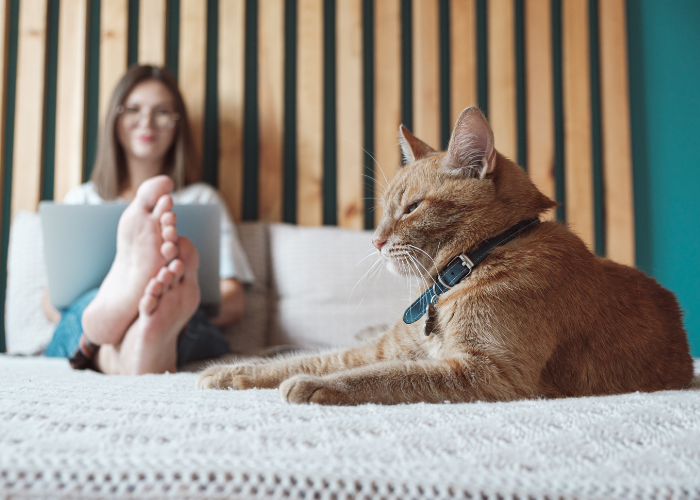
When exploring why cats are drawn to attacking feet, several key reasons emerge, each highlighting a different aspect of feline behavior:
- Mimicking Prey: The movement of feet under blankets closely resembles the movement of small prey, which instinctively attracts cats, especially kittens.
- Teething in Kittens: Young cats experience a phase of teething, during which they might find feet a suitable object to soothe their gums.
- Expression of Affection: Cats, from their kittenhood, learn to associate gentle nipping with affection, often extending this behavior to their human companions.
- Playfulness: Attacking feet can be a fun game for cats, a way of engaging in playful behavior with their owners.
- Attention-Seeking: Sometimes, cats use this behavior to grab their owner’s attention, especially if they feel neglected or bored.
Each point contributes to a comprehensive understanding of why cats might attack feet in bed, underlining the multifaceted nature of feline behavior.
Addressing and Redirecting the Behavior
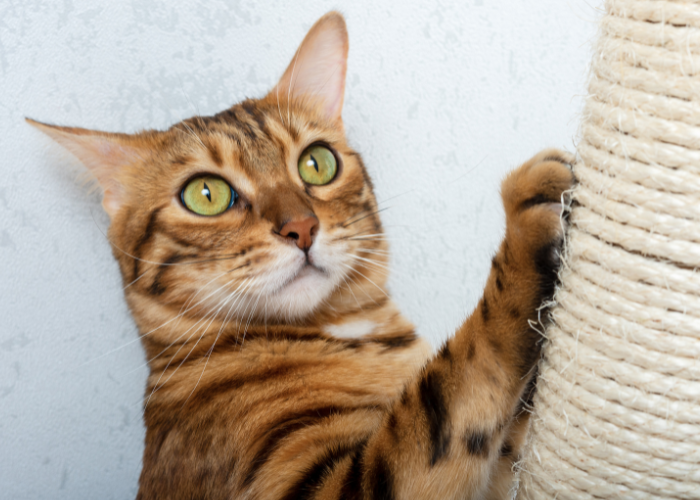
Addressing your cat’s foot-attacking behavior involves understanding and redirecting their instincts:
- Playtime and Toys: Use interactive toys to engage your cat in regular play sessions. This helps satisfy their hunting instincts more appropriately.
- Recognizing Aggression: Differentiate between playful nips and aggressive behavior. Aggression might require behavioral training or consulting a veterinarian.
- Consistency in Training: Use consistent training methods to discourage attacking feet. Remember, patience is key.
- Alternative Engagement: Give your cat alternative activities to stimulate them mentally and physically, reducing their need to attack feet.
Cat owners can foster a more harmonious living environment for themselves and their feline friends by understanding and thoughtfully addressing these behaviors.
Preventive Measures

To prevent your cat from attacking your feet in bed, consider the following strategies:
- Evening Playtime: Engaging your cat in play activities before bed can help tire them out, reducing their nocturnal energy bursts.
- Avoid Using Hands or Feet for Play: Never encourage your cat to play with your hands or feet. Use toys instead to redirect their play instincts.
- Mild Discipline: If your cat persists in attacking your feet, mild discipline like a firm “no” or gently moving them away can be effective. Avoid any harsh methods, as they can lead to fear or aggression.
- Comfortable Sleeping Environment: Ensure your cat has a comfortable place to sleep. A cozy cat bed is often more appealing than your moving feet under the covers.
These measures can help create a more peaceful bedtime routine for you and your cat, balancing their playful instincts with your need for undisturbed rest.
When to Call the Vet
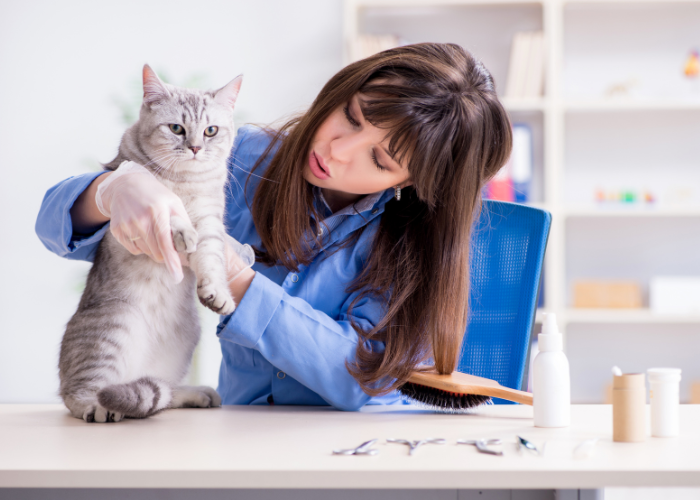
It’s important to recognize that seeking professional help is essential for your cat’s well-being. While managing common behavior like attacking feet is possible, some situations warrant veterinary assistance:
- Excessive Aggression: When your cat’s foot-attacking behavior becomes excessively aggressive, causing harm or severe distress, it’s time to contact a veterinarian.
- Persistent Behavior Changes: Consult a vet for unexplained and persistent changes in your cat’s behavior, such as increased aggression or anxiety.
- Signs of Discomfort: Contact a vet if your cat displays discomfort indicators like excessive grooming or vocalization.
- Unusual Health Symptoms: Any unusual health symptoms, including limping or favoring a paw, should prompt a vet visit.
- Professional Guidance: Veterinarians can offer expert guidance, ruling out medical causes and advising on effective behavior management.
With this understanding, let’s explore more about cat behavior.
With this understanding, being vigilant about your cat’s behavior and well-being is crucial. Knowing when to seek professional assistance ensures your feline companion receives the care and guidance they may need.
Conclusion

In conclusion, understanding why cats attack feet in bed is key to managing this behavior effectively.
It blends their instincts, playful demeanor, and communication methods.
Recognizing why cats attack feet and using strategies like playtime and setting boundaries can improve the cat-owner relationship.
Remember, patience and consistency are vital. With time and understanding, you can ensure peaceful nights and maintain the playful spirit of your beloved cat.
Frequently Asked Questions
Why does my cat attack my legs when I go to bed?
Cats attack legs when going to bed due to their predatory instincts. Your legs moving under covers can resemble prey, triggering your cat’s natural hunting behavior. This is often playful and part of their instinctual activities.
Why does my cat hide under the bed and attack my feet?
Cats hide under beds and attack feet as a form of play and hunting simulation. The confined space under the bed adds an element of stealth to their behavior, making your feet a tempting target for a surprise attack.
How do I get my cat to stop chewing on my feet?
To stop your cat from chewing on your feet, engage them in play with toys before bedtime to tire them out. Avoid using your feet as play objects and consistently discourage the behavior with mild discipline, such as a firm “no.” Redirect their attention to suitable toys.


